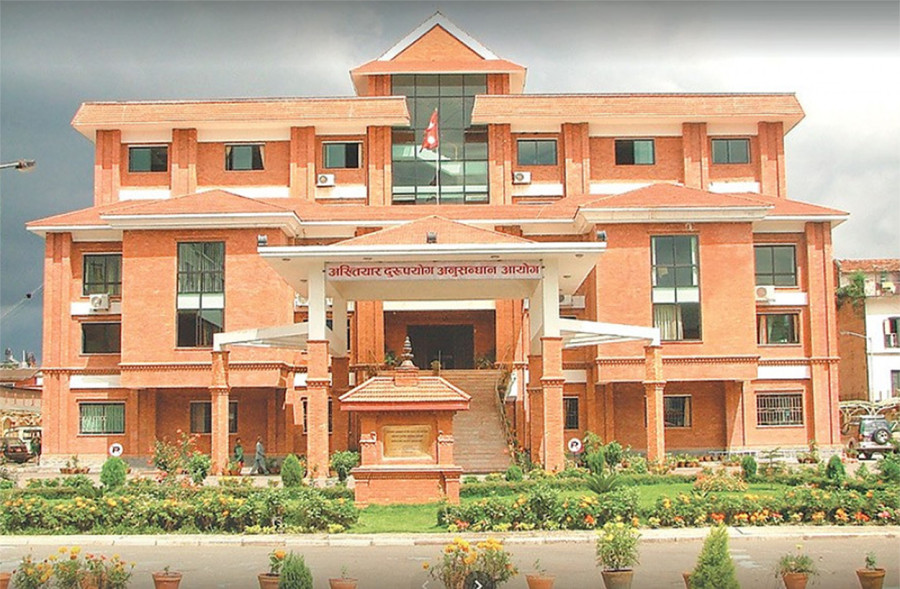National
Anti-graft body detains doctor for 25 days over report, suspends him
The doctor posted in Butwal was released after a probe panel endorsed his findings.
Arjun Poudel
On January 30, Dr Durga Surkhali, posted at the Provincial Hospital, Butwal, received a letter from the Commission for Investigation of Abuse of Authority (CIAA), asking him to report to its office.
He took a two-day leave from work and told his staffers he would be back soon. But Surkhali, who spent 25 days in CIAA custody, hasn’t returned to work.
"I thought that the commission called me to explain a medicolegal report I signed," Surkhali told the Post over the phone from Butwal. "Courts often call doctors to explain medical terms used in such reports, and I thought it was a similar call [from the commission]," he said.
According to Surkhali, officials at the commission interrogated him for a whole day regarding a report he signed in relation to a gang rape case when he was posted at the District Hospital in Humla.
A 13-year-old girl from Sarkegadh Rural Municipality, allegedly gang-raped on August 6, was brought to the hospital on September 12 last year. Surkhali said he, along with two other doctors, performed a medicolegal examination and prepared a report. He signed the report as the senior-most doctor.
The girl was brought to the hospital 35 days after the alleged incident. The doctors had said in the report that the girl’s hymen was intact. Family members of the girl later took her to Nepalgunj, where doctors prepared another report saying there were scars in her private parts.
According to Surkhali, the commission called him over after learning about the new report.
The CIAA suspended him from his job and asked Nepal Medical Council, the regulatory body of doctors, to conduct an investigation. The council formed a probe team led by Dr Harihar Osti, the senior-most forensic expert in the country.
Osti, who visited Surkhet, examined the victim. His report was similar to the one issued by Dr Surkhali.
"Our probe team could not visit Sarkegadh Rural Municipality of Humla district immediately, as there was heavy snowfall," an official at Nepal Medical Council told the Post on the condition of anonymity because he was not authorised to talk to the media. “We asked police to bring the victim to Surkhet, the provincial headquarters."
After the council team furnished the report, endorsing Surkhali’s document, the anti-graft body released Surkhali without bail, 25 days after detaining him.
"I have to report to the commission's office in Kathmandu on March 12 again," said Surkhali. "But I still remain suspended, even after the council probe endorsed my report.”
The Government Doctors’ Association of Nepal has warned that all doctors serving at state-run health facilities will refrain from medicolegal services if doctors are treated like criminals for doing their job.
"How can we carry out medico-legal services if doctors are punished even when they haven’t made a mistake?" said Dr Dipendra Pandey, chairman of Government Doctors Association of Nepal.
Nepal Medical Association, an organisation of doctors, has also warned of stern measures if action taken against medics for doing their job is not rectified.
"First, the commission does not have the jurisdiction to probe the said crime. Second, agencies concerned need to probe such incidents by forming expert panels if doctors are to be arrested as per the law," said Dr Lochan Karki, chairman of the association.
"We have drawn the attention of the Ministry of Health and Population and the Nepal Medical Council towards Surkhali’s case. It’s injustice. "
According to Karki, releasing the doctor without bail, instead of clearing him of his charges, was another mistake on the part of the commission.
Dr Kedar Narsing KC, former chairman of the association, said that the action of the anti-graft body against a doctor was condemnable. "How can a doctor perform his duty in such situations?" said KC.
Meanwhile, Ganesh Bahadur Adhikari, information officer at the commission, said that his office has the right to take doctors into judicial custody to investigate reports issued by them. "I don't know about this particular issue, but the commission can investigate anyone suspected of wrongdoings," said Adhikari. "When we take someone into custody for investigation, it does not mean we are punishing them."




 13.12°C Kathmandu
13.12°C Kathmandu














